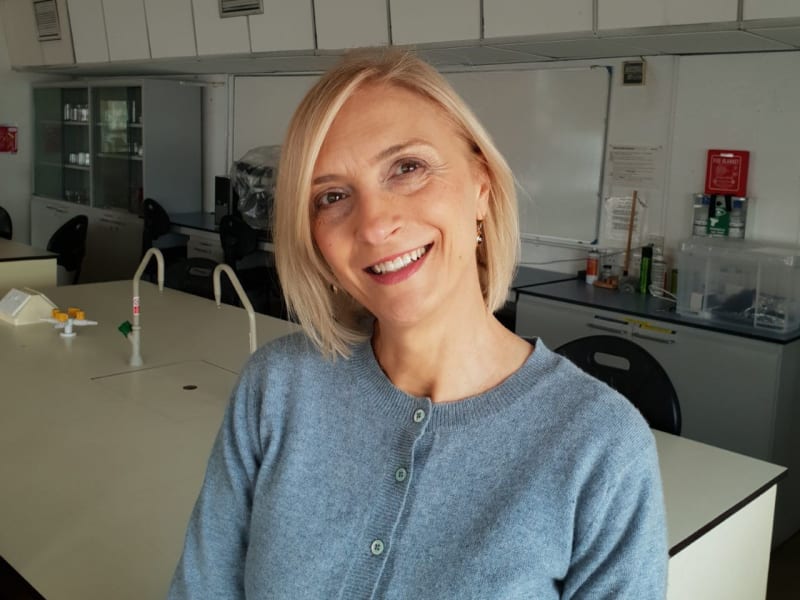



Gabriela Daniels is Programme Director for the science courses in LCF and lectures on the integrated MSc Cosmetic Science. After obtaining her degree in Chemistry with a specialisation in the technology of cosmetics and fragrance materials, she moved to the UK and worked for several fragrance and cosmetic companies. In this interview, she tells us about the challenges of being a lecturer, what makes the cosmetic industry a fascinating field and what students can expect from studying a science course in a fashion school.
After a few years gaining experience in the cosmetic industry, working for companies in Bulgaria and the UK, Gabriela started her journey at LCF right at the time when the undergraduate course in cosmetic science was taking off: “I’ve seen this subject area grow and evolve over a long period of time,” she says. “One of the most special things about the course and how I have developed with it, is that it has always been very closely aligned with the science and technology of cosmetics.
Gabriela now specialises in hair science and also teaches claim substantiation. She is very keen that, in addition to the different scientific areas explored in the MSc, the students also learn about the cosmetic industry through some business units, in which Gabriela delivers some sessions:
“The course is unique because it not only teaches science and technology, but it also involves marketing and management studies. This helps our graduates understand how their roles as science experts fit in the broader business context of the companies they work for.”
However, Gabriela highlights that the sciences dominate the course, something that future applicants should keep in mind: “They should expect quite a lot of science, especially biology and chemistry, because these are essential for understanding how cosmetic products work when applied on the human skin, hair or teeth. It is important to revise and upgrade these underpinning sciences when students begin the course. Later on, the course curriculum becomes very industry-focused, integrating briefs requiring students to develop and test products for different types of skin, hair, etc. This is a challenging, but also very motivating element of the course.”Gabriela points out that it is essential to keep the course up to date and relevant: “The cosmetic industry has become very sophisticated in the last 5 years, as it aims to cater for diverse consumer needs. The main challenge is to make sure that the products are appropriate for different consumers across the world and to meet their needs in a sustainable, benefiting local communities and not harming the environment."
"Increased awareness of the product life cycle and the societal impact of cosmetics are core to the ethos of the course, which shows how far the MSc reaches.”
For Gabriela, keeping up-to-date with the industry is also key to being a good lecturer: “Our students are very knowledge-savvy. They engage with the industry whilst on the course, so they know a lot about industry innovation. So as a lecturer, you have to learn all the time, you have to be ready to be challenged, and this is one of the best parts of my job.” She also mentions that having the opportunity to meet motivated students and being part of their professional journey is another perk of the job:
“In my position, I see young people coming fresh from school and leaving several years later having a much clearer idea of what they want to do; seeing them develop as individuals and professionals is very rewarding.”
Even though some may think it’s strange to teach cosmetic science in a fashion school, Gabriela believes this helps to approach the different subjects explored in the MSc in a more creative way: “The course provides an understanding of the fun and live-enhancement effect of cosmetics, so students get to experience this creativity in an open-minded environment – this is essential for cosmetics, because if they’re not pleasant and fun, then there’s no point using them.” According to Gabriela, the MSc also prepares students to face highly-demanding environments, something that industry partners have noticed when they receive students during their placement year:
“The industry is extremely positive about the level of preparation our students have to enter a wide range of roles. They always praise our students’ readiness to work, their ability to develop projects that are important for the company and the work ethic that they bring along with them.”
For those looking to pursue a career as cosmetic scientists, Gabriela says the secret for success is to always remember why this industry is so unique and empowering for so many people: “Everybody who wishes to shine in the cosmetic industry has to have that personal joy and passion for what the industry brings to people. If you work with that in mind, you’re likely to be more creative and your products, your projects and the company you work for are always going to be successful.”